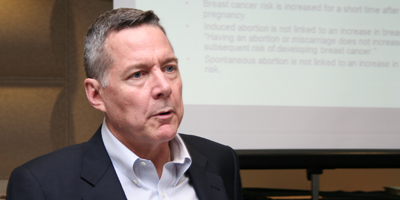
 COLUMBIA—If a woman has an abortion, does she increase her risk of getting breast cancer later in life?
COLUMBIA—If a woman has an abortion, does she increase her risk of getting breast cancer later in life?
For many years, this question has been the subject of heated debate in the medical community, in faith communities, and among pro-life activists around the world.
A series of studies over the years have had mixed results, with many concluding that abortion does not increase the risk of cancer.
However, some studies have shown possible increases in the risk, and a small but vocal group of medical professionals say it bears further study.
This debate and the other negative effects of abortion were the focus of a talk April 27 at St. Joseph Church in Columbia given by Dr. Mark A. O’Rourke, a specialist in medical oncology and hematology at Cancer Centers of the Carolinas in Greenville. O’Rourke is a member of St. Mary Church in Greenville and has practiced medicine for 30 years.
The talk was sponsored by the St. Gianna Respect Life Committee at St. Joseph, www.stgiannaguild.org.
O’Rourke said risk factors for breast cancer are well-documented, including age, because women over 50 are more likely to develop the disease.
Other factors include having a parent or a sibling with the disease; reaching puberty before 12; beginning menopause after 55; having a first child after the age of 30; and undergoing hormone therapy.
Women who have had one or more benign biopsies of their breast tissue and those with abnormal growth of breast tissue cells also show a higher risk.
The doctor described several studies that considered the influence of abortion on breast cancer risk.
“Induced Abortion and the Risk of Breast Cancer,” published in the New England Journal of Medicine in 1997, looked at Danish Cancer Registry information from 1935 to 1978, which surveyed 1.5 million women, and more than 10,000 who had developed breast cancer.
O’Rourke said the study generally concluded that induced abortion had no overall effect on breast cancer risk, although women who had an abortion early in pregnancy seemed to have less of a risk than women who had an abortion after 12 weeks gestation.
A 2009 study that looked at data from the Seattle area did list induced abortion, along with other risk factors, that seemed to indicate a higher risk for developing an especially aggressive form known as triple negative breast cancer.
The results, however, have been debated, O’Rourke said.
Proponents of the abortion-breast cancer link, such as Dr. Joel Brind of Baruch College and Dr. Angela Lanfranchi, a professor at Robert Wood Medical School in New Jersey, maintain that abortion possibly leaves women with a higher cancer risk because breast tissue that develops during early pregnancy is more susceptible to cancer, he said.
A correlation cannot definitely be established according to his study of the data, the oncologist said, adding that the important thing is for scientists to remain open-minded and take an objective look at all data when studying the effects of abortion on women’s future health.
He said a woman’s exposure to estrogen throughout her lifetime contributes substantially to her risk for breast cancer.
“It is plausible that miscarriage or induced abortion could affect a woman’s female hormone experience and increase [her] risk for breast cancer, but clear and consistent evidence in favor of such an effect is lacking,” O’Rourke said.
Studies have shown that use of oral contraceptives can have serious side effects, including an increase in risk of hypertension, stroke and blood clots. He cited data on the American Cancer Society website that indicates recent use of birth control pills is one choice that can increase a woman’s risk of developing breast cancer. The site notes that research shows a woman’s risk decreases after she stops taking the pills.
The doctor said it was worthwhile to continue studying the data and to consider abortion’s effects on all aspects of a woman’s health, both physical and mental.
“Abortion is not good for society, and it’s not good for the woman,” O’Rourke said.
Beside the obvious death of the unborn child, induced abortion is harmful to women’s psychological and spiritual health, damages family relationships and puts women at risk from direct physical complications of the abortion itself, he added.
During a question and answer period, some people in the audience asked what it was like to have Catholic, pro-life values and work in a profession where values are more often influenced by the secular world.
“I was always pro-life in medical school, but at times it was very intimidating,” he said. “It’s doable, but it takes fortitude. There’s an intimidation factor because a lot of academics and people doing studies on stem cells and other topics are pro-choice. Many people are a bit shy about hurting their careers.”
He praised recent efforts to form a guild for Catholic physicians in South Carolina, and said groups such as the St. Gianna guild are also very important.
“We need to form our own culture, a culture of life, and continue to interact with each other,” O’Rourke said.
